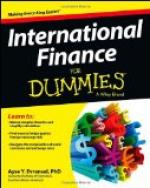FOOTNOTES:
[Footnote 4: Quoted by the Financial News of September 28, 1915.]
CHAPTER VI
THE EVILS OF INTERNATIONAL FINANCE
No one who writes of the evils of international finance runs any risk of being “gravelled for lack of matter.” The theme is one that has been copiously developed, in a variety of keys by all sorts and conditions of composers. Since Philip the Second of Spain published his views on “financiering and unhallowed practices with bills of exchange,” and illustrated them by repudiating his debts, there has been a chorus of opinion singing the same tune with variations, and describing the financier as a bloodsucker who makes nothing, and consumes an inordinate amount of the good things that are made by other people.
It has already been shown that capital, saved by thrifty folk, is essential to industry as society is at present built and worked; and the financiers are the people who see to the management of these savings, their collection into the great reservoir of the money market, and their placing at the disposal of industry. It seems, therefore, that, though not immediately concerned with the making of anything, the financiers actually do work which is now necessary to the making of almost everything. Railway managers do not make anything that can be touched or seen, but the power to move things from the place where they are grown or made, to the place where they are eaten or otherwise consumed or enjoyed, is so important that industry could not be carried on on its present scale without them; and that is only another way of saying that, if it had not been for the railway managers, a large number of us who at present do our best to enjoy life, could never have been born. Financiers are, if possible, even more necessary, to the present structure of industry than railway men. If, then, there is this general prejudice against people who turn an all important wheel in the machinery of modern production, it must either be based on some popular delusion, or if there is any truth behind it, it must be due to the fact that the financiers do their work ill, or charge the community too much for it, or both.
Before we can examine this interesting problem on its merits, we have to get over one nasty puddle that lies at the beginning of it. Much of the prejudice against financiers is based on, or connected with, anti-Semitic feeling, that miserable relic of medieval barbarism. No candid examination of the views current about finance and financiers can shirk the fact that the common prejudice against Jews is at the back of them; and the absurdity of this prejudice is a very fair measure of the validity of other current notions on the subject of financiers. The Jews are, chiefly, and in general, what they have been made by the alleged Christianity of the so-called Christians among whom they have dwelt. An obvious example of their treatment in the good old days, is given by Antonio’s behaviour to Shylock. Antonio, of whom another character in the Merchant of Venice says that—




